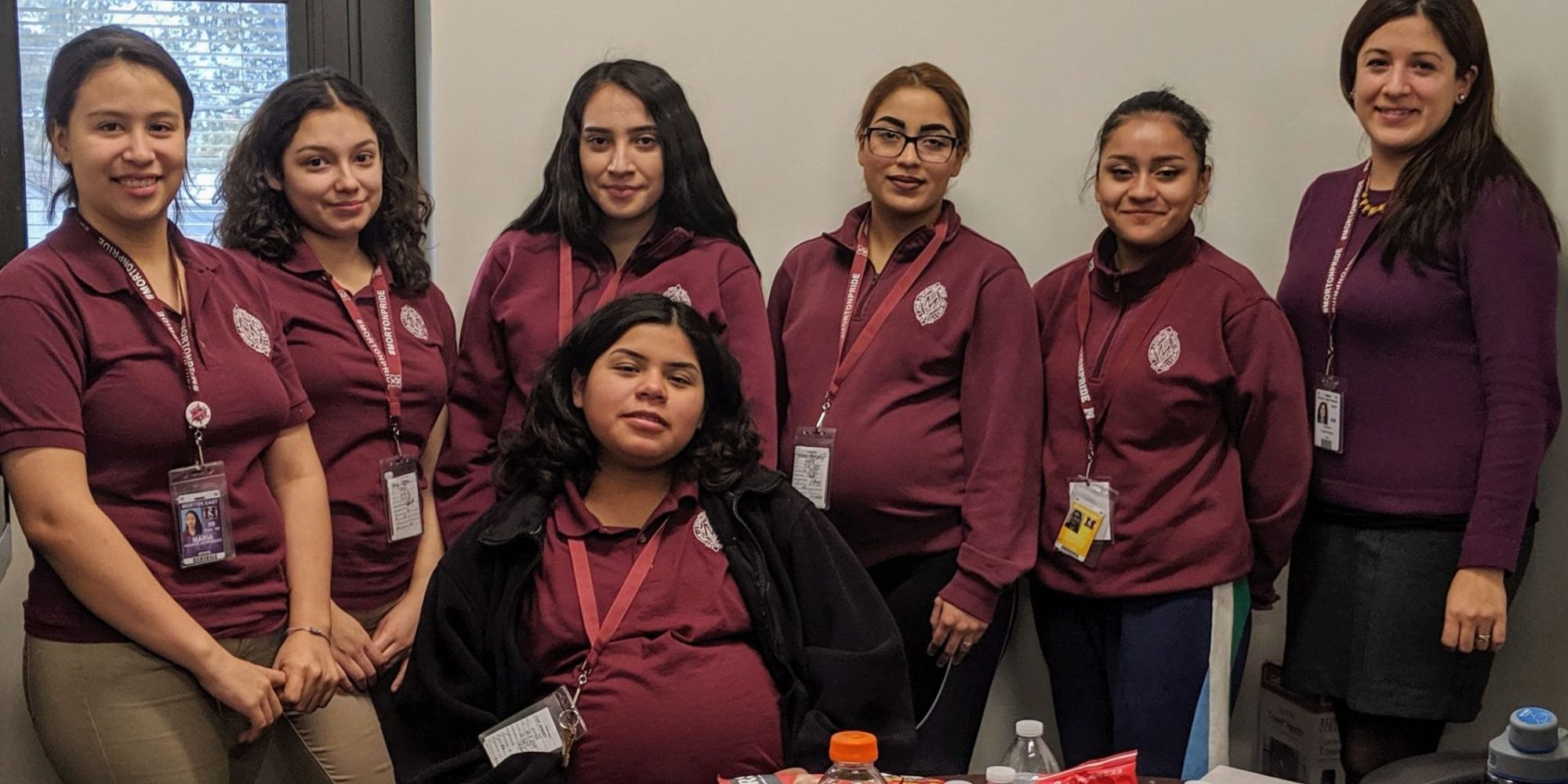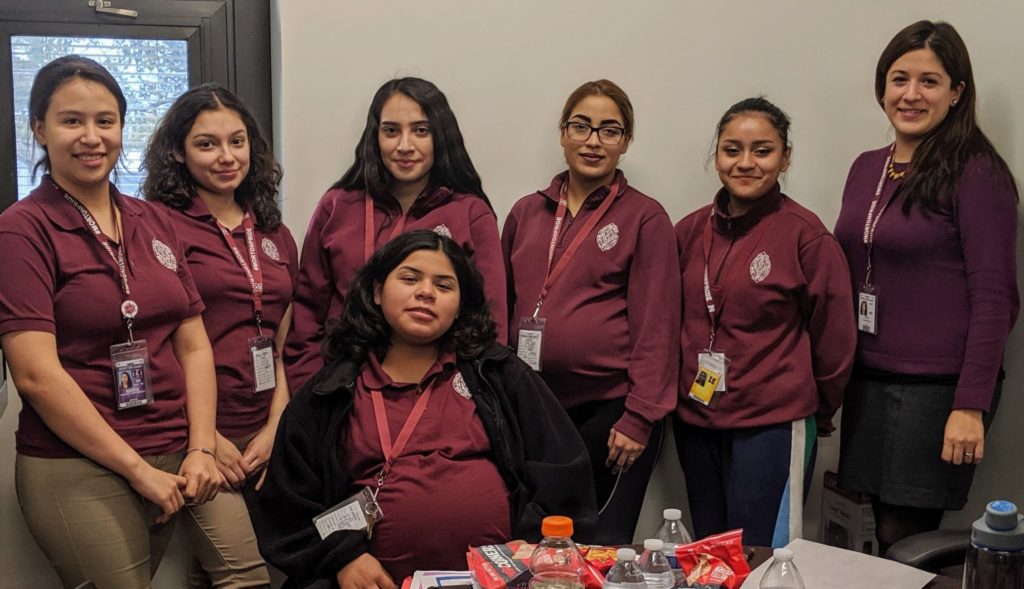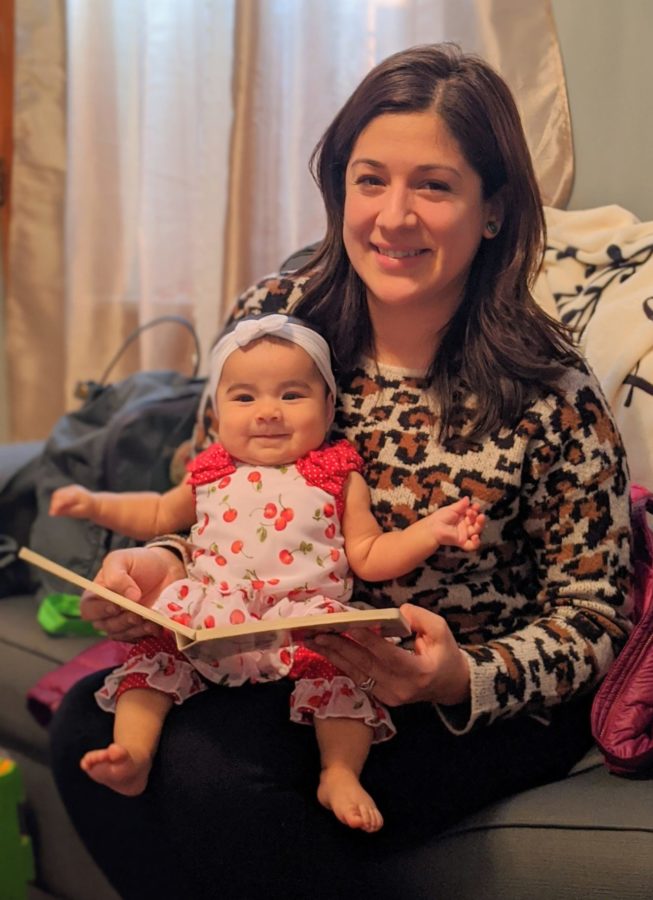Creating supportive spaces for student mothers


In the midst of the whirlwind that is an average US high school, Noemy Céspedes creates a unique space for fellowship and reflection.

Each week, Noemy, a New Moms Family Support Specialist, leads a support group for young mothers at Morton East High School. The group always meets on Wednesday, but the time changes so moms only miss class once every six weeks.
“I think it’s really important to give these young mothers a safe space to gather and to discuss whatever’s on their minds and whatever they’re hearing in their hearts,” Noemy said. “I always tell my young moms, ‘Who better to understand where you’re coming from than someone else who is experiencing the same thing you are.’”
The group covers “a little bit of everything”, but discussion is centered around preparing for motherhood and being a parent. This includes breastfeeding, c-sections, what makes someone trustworthy, etc. Sometimes the moms will ask about things they’re currently experiencing, Noemy said.
In addition to the support group, Noemy also leads in-home coaching appointments twice a week with moms from the group.
We sat down with Noemy to talk about her role as a Family Support Specialist and what it’s like working with young moms in a school setting.
What is it like to work with students?
I think that I’m actually at an advantage that the moms are in school. No matter what is going on in their lives, either personally, or wherever they are in their journey with motherhood, school is always the grounding point for them. No matter what’s going on, they always come to class. It’s like our hub.
What has been the most challenging part of your job?
Sometimes a teenager isn’t the most reliable. One of the challenges is setting up a time for a home visit or a time to meet somewhere, and then that falls through. I constantly have to remind myself, “You’re working with someone incredibly young and who has other priorities.”
What is the most rewarding part of your job?
The most rewarding thing is knowing that these moms come into our program, not because they are required to, but because they want to. They want to learn to be better mothers. They want to learn to be as prepared as they can be for motherhood or childbirth. I’m really impressed by that. They have a genuine desire to just be the best parent they can be.
What should people know about this support group?
It’s important to have a space with people who know where the moms are coming from, like their peers. What I like to see, and what normally happens, are a lot of friendships that come out of these groups.
I also like the consistency of the group being every Wednesday and that we come to them in their school. It makes it easier for the moms. It makes it more accessible, so they don’t have to arrange childcare, or have to be picked up or dropped off.
What should people know about the in-home coaching visits?
There is nothing that compares to the honor and privilege of being allowed into someone’s home. I am invited in to have that one-on-one time with them and their baby where they live. These young moms can be very private individuals, so when they open the doors and they see that I don’t bite, it brings another level of the relationship that you build with the young mom.
Do you meet the moms’ families during these visits?
Yes. The participant’s mothers are always very curious about me and what I do. Since I work in Cicero, a lot of the families are Spanish-speaking, and English is their second language — if they speak English at all. Fortunately, I can speak Spanish, so I meet them in a language that they understand. Once they see and hear that we’re talking about parenting, the importance of preparing for motherhood, and finishing your studies, they’re like “Oh, okay you’re cool. You can come back.”
Do the young moms like to speak Spanish in the support group?
The mothers that I see in the high school all speak English. Their classes and their homework are in English. It’s the preference of wanting to speak Spanish or being more comfortable in that language that adds another layer of comfort into the room. I feel like once they realize, “Oh, she speaks Spanish like my mom does, and my grandma does, and my aunt, and my dad,” there’s more of a sense of connection. I believe it makes them feel more at home.
What is a misconception about New Moms’ Family Support program that you’d like to clear up?
Usually when people ask me what I do for a living and I say I work with mothers that are in high school, I immediately get a lot of, “Oh, those poor young moms.” It’s the idea that their lives are over, or they’ve made a huge mistake. First of all, their lives are not over. Their lives are just changing. Like I said earlier, it’s wonderful that these moms have decided on their own to participate in all these great programs that we offer. They want to learn, and they want to do better. They go on to graduate high school and they go on to college. Again, their life is not over, it’s just changed.
How does your work fulfill New Moms’ mission?
I think of one mom that I worked with. When she came to our program, she was in her second trimester and she was really behind on her credits in school. So, she went to night school which means she was in school from 8:30am to 7:30pm. In addition to that, she was maintaining her GPA, she was coming to group every week, and she was coming to her home visits as well. Her goal — because we talk about goals a lot at New Moms — was to graduate in May. She was determined to do it. There were days she wasn’t feeling well. There were days she was exhausted. But she stuck with her goals and she was able to make up her credit hours. She graduated in May and is now attending Morton College. She’s still in our program and participates in home visits with me.
I know we talk about grit a lot, and this is a mom who has a lot of grit. It would have been very easy for her to say, “This is too hard for me. I’m not going to do it, or I’ll figure something out later,” but she stuck to her goal of wanting to finish in May and she did!
What advice would you give to young moms thinking about joining the program?
What I always tell my participants when I meet them initially is to give it a try. Give us a chance. Worst case scenario you don’t like it and you don’t ever have to see us again. But when you do get something out of it, you learn, you enjoy yourself, you make those friendships and connections, and you keep coming. You grow as a person and as a parent. So, if you’re wondering if you should call, I always say “What’s the worst that could happen?”</sp